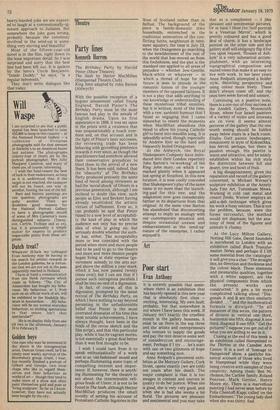Party lines
Kenneth Hurren,
The Birthday Party by Harold Pinter (Shaw Theatre) The Sash by Hector MacMillan (Hampstead Theatre Club)
King John adapted by John Barton (Aldwych)
With the possible exception of a bygone amusement called Young England, Harold Pinter's The Birthday Party must be the most famous bad play in the annals of English drama. Upon its first appearance in 1958, it was set upon in the prints with a virulence that was unquestionably a touch overdone and, on that account and in the light of Pinter's later successes, the reviewing trade has been behaving with grovelling penitence towards it ever since, as though the practitioners had somehow allowed their conservative prejudices to blind them to the arrival of a new Ibsen. It has been said, indeed, that the 'obscurity' of The Birthday Party produced precisely the same kind of recoil among reviewers as had the 'moral shock' of Ghosts in a previous generation, although I am inclined to doubt this view, such people as Eliot and Beckett having already established the artistic virtues of bafflement. Even so, it, can probably be said that Pinter raised to a new level of acceptability the kind of play in which the audience not only has no precise idea of what is going on, but seriously doubts whether the author has, either. The acceptability more or less coincided with the period when more and more people had to be paid to go to the theatre and more and more theatre people began living at state expense (government subsidy to the arts surged above the million a year mark, which it has now passed twenty times over), but I can see that if I pursue such outrageous parallels I shall be into no end of a digression.
In fact, of course, all this is digression, prompted by the latest revival of The Birthday Party, on which I have nothing to say beyond persisting in the unfashionable belief that Pinter is the most overrated dramatist of his time (his most notable achievements, I have always thought, have been in the fields of the revue sketch and the film script), and that this particular play, while it has its vagrant merits, is not essentially a great deal better than it was first thought to be.
I wish I could turn from it to speak enthusiastically of a work cast in an 'old-fashioned' mould and perhaps illuminating some topic of compelling interest and importance. If, however, there is anyth ing illuminating for the theatre to say about the interminable religious feuds of Ulster, it is not to be found in The Sash, although Hector MacMillan produces the small novelty of setting his account of Protestant-Catholic bigotries in the
West of Scotland rather than in Belfast. The background of the piece is family-domestic (two households, entrenched in the traditional animosities of the conflicting faiths, neighbours in tenement squalor), the time is July 12, when the Orangemen go marching to the bewilderment of the rest of the world that has moved on from this foolishness, and the plot is the standard one applied to all areas of prejudice — whether Jew-Gentile, black-white or whatever — in which a thread of hope for the future is seen to intrude in the romantic liaison of the younger members of the opposed factions. It is not a play that adds anything to our knowledge or understanding of these mysterious tribal enmities, but it is written, most of the time, with a raw, sardonic humour that I found so engaging that I came somewhat to resent the moments when MacMillan abandons this mood to allow his young Catholic girl to burst into maudlin song. It is splendidly acted, though, especially by Andrew Keir as the hard and frequently boiled Orangeman.
At the Aldwych, the Royal Shakespeare Company have introduced into their London repertory John Barton's 're-working' of the King John story, on which I remarked glumly when it appeared last spring at Stratford. In this new location, it is now coolly conceded that Shakespeare's play of the same name is no more than the launching-pad for this one, and the adaptation now goes considerably farther in its departures from that original. At the same time Barton has abandoned that disconcerting attempt to imply an analogy with our contemporary situation and, despite occasional unease and embarrassment at the `send-up' nature of the enterprise, I rather enjoyed it.


































 Previous page
Previous page